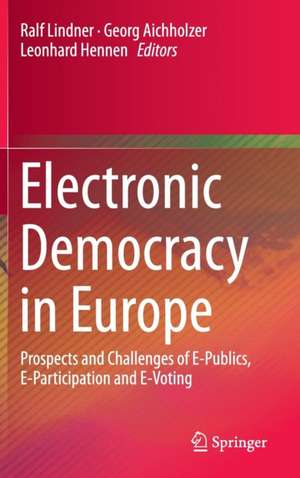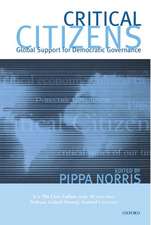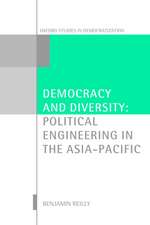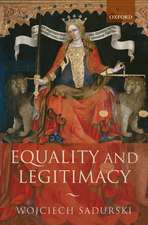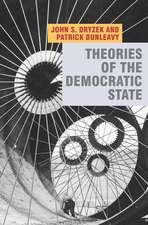Electronic Democracy in Europe: Prospects and Challenges of E-Publics, E-Participation and E-Voting
Editat de Ralf Lindner, Georg Aichholzer, Leonhard Hennenen Limba Engleză Hardback – 14 mar 2016
| Toate formatele și edițiile | Preț | Express |
|---|---|---|
| Paperback (1) | 636.45 lei 6-8 săpt. | |
| Springer International Publishing – 25 apr 2018 | 636.45 lei 6-8 săpt. | |
| Hardback (1) | 642.68 lei 6-8 săpt. | |
| Springer International Publishing – 14 mar 2016 | 642.68 lei 6-8 săpt. |
Preț: 642.68 lei
Preț vechi: 756.09 lei
-15% Nou
Puncte Express: 964
Preț estimativ în valută:
122.97€ • 128.41$ • 101.55£
122.97€ • 128.41$ • 101.55£
Carte tipărită la comandă
Livrare economică 15-29 aprilie
Preluare comenzi: 021 569.72.76
Specificații
ISBN-13: 9783319274171
ISBN-10: 3319274171
Pagini: 205
Ilustrații: XVIII, 195 p. 3 illus. in color.
Dimensiuni: 155 x 235 x 14 mm
Greutate: 0.48 kg
Ediția:1st ed. 2016
Editura: Springer International Publishing
Colecția Springer
Locul publicării:Cham, Switzerland
ISBN-10: 3319274171
Pagini: 205
Ilustrații: XVIII, 195 p. 3 illus. in color.
Dimensiuni: 155 x 235 x 14 mm
Greutate: 0.48 kg
Ediția:1st ed. 2016
Editura: Springer International Publishing
Colecția Springer
Locul publicării:Cham, Switzerland
Public țintă
ResearchCuprins
Acknowledgements.- Electronic Democracy in Europe. An Introduction.- Part I: The E-Public in Europe.- Part II: E-Participation.- Part III: E-Voting.
Notă biografică
Ralf Lindner is a Professor for Political Science at the Department for Politics & Public Affairs at the Quadriga Hochschule in Berlin and a senior researcher at the Fraunhofer Institute for Systems and Innovation Research (ISI) in Karlsruhe. He received his degree in political science and economics from the University of Augsburg, completed graduate work at the University of British Columbia (Vancouver) and post-graduate studies at Carleton University (Ottawa). His doctoral dissertation focuses on the application and integration of digital networks in the communication strategies of intermediary organisations. In addition to his research in the area of new media and society, Professor Lindner has specialised in science, technology and innovation policy analyses.
Leonhard Hennen studied sociology and political sciences, Dr. Phil. in sociology from Technical University Aachen, Germany. After five years as a social scientist at the departmentof "Technology and Society" at the National Research Centre Jülich (projects on "technology and everyday life", "risk-communication"), he was (1991 to 2005) project manager at the Office of Technology Assessment at the German Parliament, which is run by the Institute of Technology Assessment, Research Centre Karlsruhe. He has been responsible for TA projects on Genetic Testing, Pre-implantation Diagnostics, and Brain Sciences as well as for projects on public acceptance of technologies and technology controversies, Sustainable Development, Research Policy and others. He participated in several European projects on concepts and methods of TA (Europta, TAMI). Since 2006 he has been coordinator of the European Technology Assessment Group (ETAG). Research interests: Sociology of Technology, Technology Policy, Concepts and Methods of Technology Assessment, TA in the field of Biomedicine.
Georg Aichholzer is project director and senior researcher at the Institute of Technology Assessment (ITA) of the Austrian Academy of Sciences (since 1993), and senior lecturer at Vienna University of Economics and Business (since 1992). He holds a PhD in Sociology (University of Vienna) and has extensive research and teaching experience in technology assessment and impact assessment, with a special focus on interrelations of information and communication technologies and society, as well as related policies. Recent fields of interest are electronic governance and electronic democracy, particularly in the area of climate policies.
Leonhard Hennen studied sociology and political sciences, Dr. Phil. in sociology from Technical University Aachen, Germany. After five years as a social scientist at the departmentof "Technology and Society" at the National Research Centre Jülich (projects on "technology and everyday life", "risk-communication"), he was (1991 to 2005) project manager at the Office of Technology Assessment at the German Parliament, which is run by the Institute of Technology Assessment, Research Centre Karlsruhe. He has been responsible for TA projects on Genetic Testing, Pre-implantation Diagnostics, and Brain Sciences as well as for projects on public acceptance of technologies and technology controversies, Sustainable Development, Research Policy and others. He participated in several European projects on concepts and methods of TA (Europta, TAMI). Since 2006 he has been coordinator of the European Technology Assessment Group (ETAG). Research interests: Sociology of Technology, Technology Policy, Concepts and Methods of Technology Assessment, TA in the field of Biomedicine.
Georg Aichholzer is project director and senior researcher at the Institute of Technology Assessment (ITA) of the Austrian Academy of Sciences (since 1993), and senior lecturer at Vienna University of Economics and Business (since 1992). He holds a PhD in Sociology (University of Vienna) and has extensive research and teaching experience in technology assessment and impact assessment, with a special focus on interrelations of information and communication technologies and society, as well as related policies. Recent fields of interest are electronic governance and electronic democracy, particularly in the area of climate policies.
Textul de pe ultima copertă
This edited book is the first of its kind to systematically address the intersection of e-democracy and European politics. It contributes to an improved understanding of the role that new media technologies play in European politics and the potential impact that Internet-based political participation processes may have on modern-day representative democracy in Europe. A unique, holistic approach is taken to examine e-democracy’s current state and prospects in Europe from three, partially overlapping and interlocking perspectives: e-public, e-participation and e-voting. The authors provide both theory-inspired reflections on e-democracy’s contribution to the formation of the European public sphere, as well as rich empirical analyses of contemporary e-participation phenomena such as the European Citizens’ Initiative or e-voting practices in Estonia. Based on the presented findings, the concluding chapter combines a prospective outlook with recommendations for future paths towards meaningful integration of e-democracy in European politics and governance.
Caracteristici
First academic book in the field of e-democracy and e-participation with a specific focus on European politics and institutions Brings together three core dimensions of e-democracy (e-public, e-participation and e-voting) and discusses their theoretical and practical implications Provides a concise overview of the main currents of the contemporary academic debate on internet and democracy Develops valuable policy recommendations for leaders in European politics and institutions Includes supplementary material: sn.pub/extras
